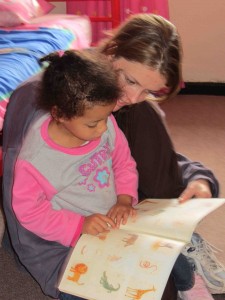 Small reading clubs offer lovely opportunities for in-depth exploration of stories and books with children. All you need is one or two energetic adults who can read, a basket or bag of books, and a few children – and you’ve got the makings of a reading club! If you add writing and drawing tools like crayons, pencils, pens and paper, you’ll be all set to support the growth of young authors. But here’s the essential ingredient – a love of stories and a desire to share them with children!
Small reading clubs offer lovely opportunities for in-depth exploration of stories and books with children. All you need is one or two energetic adults who can read, a basket or bag of books, and a few children – and you’ve got the makings of a reading club! If you add writing and drawing tools like crayons, pencils, pens and paper, you’ll be all set to support the growth of young authors. But here’s the essential ingredient – a love of stories and a desire to share them with children!
Perhaps you’d like to try this out, but you’re not someone who knows children’s stories and books well. Maybe you’re not sure which aged children you’d most enjoy sharing stories with. So, what do you do? Try spending some time browsing in the children’s section of good bookshops or libraries. Get to know an experienced children’s librarian and ask for advice about the books that children enjoy. Watch how others tell and read stories. Read a range of children’s picture books and novels and notice which ones you find most satisfying, fill you with delight and ‘speak’ to you. These are the stories you’ll be able to pass on most successfully. All of this will guide you into action!
You could start a club at home with your own children and a few of their friends. Or, you could offer to start a reading club with children at a venue like a local school, church, mosque or library. The ages of the children can be from tots to teens. It’s up to you, what you feel capable of doing and are comfortable with. The same goes for the length of each session – anything from half an hour to two hours is fine.
In a small club, you can quickly develop close relationships with the children. Spend time talking and listening to one another – building trust and languages for literacy! Share your favourite books and find out each child’s personal taste in stories. Over time, you’ll get to know how to extend their reading, because in a small group it’s easy to observe how they are doing and for everyone to speak and be heard.
You may like to welcome the children’s parents or other family members to stay and join in. Get to know them and find out which languages they use at home. See if they’d like to bring stories to tell or read in these languages or whether they’d like to contribute in other ways.
And once your reading club is up and running, continue to visit a library with a good children’s section. Borrow at least one story that you really like to read aloud to your group each session. As you get to know the children, you’ll be able to start looking for stories that deepen their curiosity and interests!
Whatever you choose to do in your reading club, the main thing is that you all enjoy yourselves as you discover and share stories together.